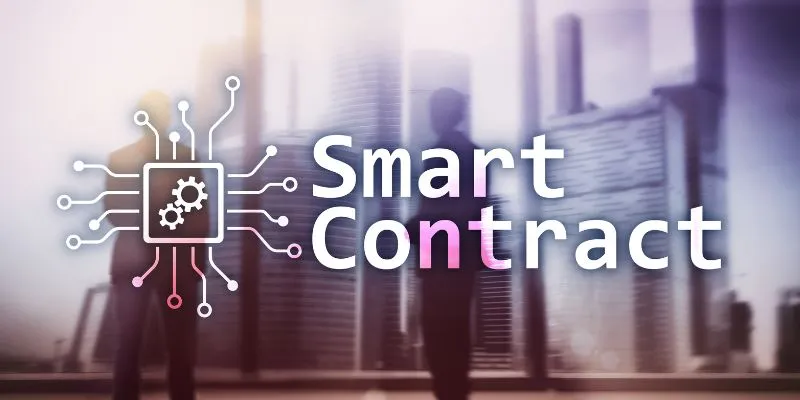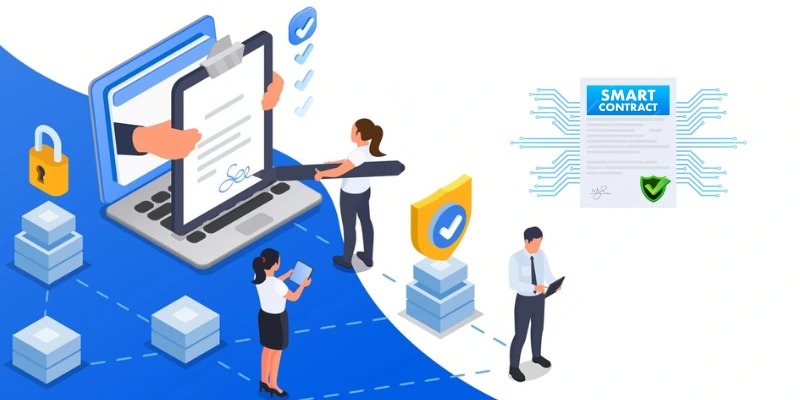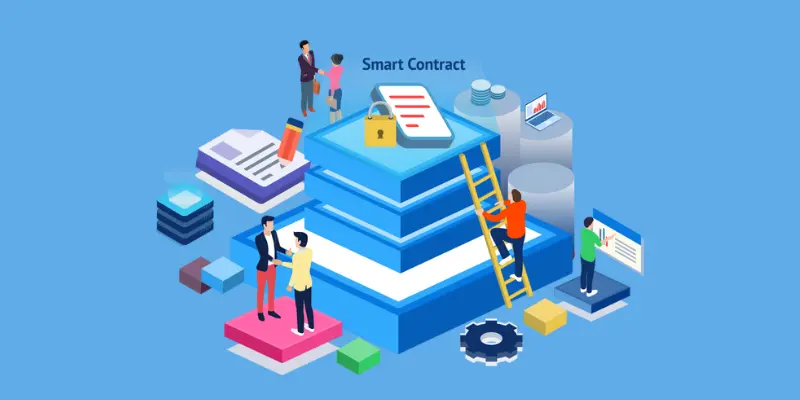Ethereum introduced smart contracts in 2015 to much skepticism; by 2023, however, companies from around the globe were competing to develop them. The smart contract market stood at $183 million in 2023 and is projected to grow to $1.5 billion by 2032.
Reintroduced! That is correct! Ethereum did not invent or develop smart contract technology - instead, it promoted and advanced the idea. Nick Szabo (a pioneer in blockchain technology and potential candidate for Satoshi Nakamoto) originated this concept in the 90s or early 00s.
Smart contracts can facilitate financial transactions without intermediaries, lowering costs and improving efficiency while speeding up and streamlining the process and decreasing its potential.
Vending machines offer a fascinating example of smart contract applications. If you seek to utilize Smart Contract Development Services to your advantage and gain more insight into the costs and time frame involved with its creation, then this may be just what you are searching for.
As part of our previous guide on blockchain app development, we discussed ways to get started with Blockchain App Development. Now, in this blog post, we're diving further into smart contracts: what they bring to your company in terms of benefits and costs, as well as any disadvantages or drawbacks they present - let's have this conversation all about them!
What Are Smart Contracts (Smart Agreements)
.webp)
A "smart contract" refers to any program on a blockchain that takes effect when certain conditions are fulfilled and acts accordingly—in other words, self-executing agreements designed so that action will occur automatically when certain conditions are fulfilled.
Contracts allow two or more individuals or businesses to trade things of a specific value in a secure and transparent environment without the involvement of third parties or realtors.
Smart contracts run using Blockchain. Their terms are stored in an unreliable database that doesn't permit changes.
Smart contracts play an indispensable role in developing DeFi (decentralized finance) applications and are one of the most used applications of blockchain technology, alongside NFTs and cryptos.
Skills Smart Contract Developers Should Have
If you're planning to build an enormous project, you need to choose a programmer who is proficient in the following areas :
Solidity
Solidity is an advanced programming language developed by the Ethereum Network to build and manage smart contracts. Knowing and using Solidity is a vital skill for smart contract developers.
Ethereum Virtual Machine or EVM
EVM is the program that allows the creation of smart contracts built upon the Ethereum Network. The operation of this software is crucial for smart contract developers because EVM checks the condition of the network after the chain has created new blocks.
DApp
DApp development involves the creation of applications that are decentralized based on the way they work. The code used for this development differs from standard application development since the backend code is stored on the P2P network, which is decentralized.
Consensus Algorithm
On the Blockchain, the consensus algorithm, a computer science algorithm that helps to establish trust across networks with various participants and nodes, is used.
Business Benefits of Smart Contract Development
There are many benefits to the development of smart contracts. Let's look at each of them individually in detail:
-
Accurate: Smart contracts minimize the risk of mistakes in the terms that are added.
-
Independent: There is no involvement from any third party since the contract's participants make all the details.
-
Lower Costs: With traditional contracts, the deal's parties must pay more in commissions and fees for intermediaries. No intermediaries mean no additional expenses.
-
Secure and Reliable: The smart contract is stored in a distributed system, making it difficult to alter or duplicate. In addition, the contract is stored on every node in the network. Therefore, it isn't lost.
-
Sustainability: Unlike traditional contracts, Smart contracts are digital. This means there is no need for paper, making it more sustainable.
Smart Contract Development Challenges
Despite increasing acceptance, Smart Contract Development Services is less well-known to developers because of its distinctive application and design. Although they can streamline processes and cut down on transaction costs, significant obstacles remain to their greater use.
Smart contract development challenges include:
-
Security and privacy: Smart contracts are free, making them vulnerable to hacks and malicious actions. Solutions include private blockchains, the increased use of cryptography, and hybrid options for the storage of data;
-
Legal Issues: Compliance with various nations' regulations and laws and changes to rules or agreements could necessitate the development of new contracts.
-
Data Privacy Regulations vary, and there is a need to understand the legal aspects of the coding process;
-
Oracles: Oracles are tools that provide information to smart contracts using sources not on the Blockchain. This can lead to vulnerabilities since hacked Oracles could alter the data. Solutions involve policies that address the possibility of failures for Oracle providers;
-
Insufficiently skilled developers: Usability problems can be caused by the absence of specific capabilities required for Smart Contract Development Services, such as the ability to master cryptography as well as non-traditional programming languages such as Solidity;
-
Scalability: Blockchain systems require improvements in access, security, and speed to increase the effectiveness of smart contracts since their capabilities to process transactions are less robust than those of traditional systems.
How Much Does a Smart Contract Cost?

Smart Contract Planning is an integral element of any blockchain-related development project. They assist developers in creating decentralized applications (dApps) using intricate logic. They enable users to perform transactions without the need for centralized institutions. Furthermore, it's possible to design smart contracts that different parties can use by defining particular requirements for each of the participants of the digital contract.
But smart contracts can be expensive—indeed, they are frequently a vital cost element in a dApp's budget. What is the approximate cost of developing a smart contract?
We've put together an extensive list of the most commonly used factors that influence the price of using smart contracts. We hope this list will help you understand the factors that affect your budget and make a well-informed decision about how much you can invest in this particular project.
Project Complexity
The more complicated your smart contracts are, the higher the deployment costs. Engineers must comprehend all of the required features and ensure that everything is working safely and securely within an existing ecosystem created in a different language or on a different platform (e.g., Ethereum).
Suppose there are several moving parts in a particular task, such as transferring funds from one account to another. In that case, you should anticipate some delays during testing because there needs to be a lack of resources to support the task.
Maintenance and Post-Delivery Services
The cost estimate for the project's maintenance depends on the number of modifications you'd like the Smart Contract Development Services to implement changes to the project. These factors are taken into consideration:
How complicated are your contract's smart contracts? It will depend on your business's requirements. However, if you're running the most complex smart contract that includes many callbacks, it'll take more time and cost more than one that does not require all the extra actions and steps. This is why the cost of developing a smart contract can increase multiple times.
Does your codebase conform to industry standards? What are its capabilities compared to other popular programming languages? Although most programmers are well aware of the best practices when creating their software, There's no guarantee the coding standards were all adhered to throughout the development process or that they've been updated over time as new features were added. This can cause issues later on when attempting to integrate with other systems within the company and will likely increase the costs to fix such problems before the launch.
Even if your codebase conforms to the industry standard, it may need to be more user-friendly. This could make it difficult to understand what functions are doing and how they work together.
The Number of People who are involved in your Project
A lot of the complexity in your concept determines the team needed to carry it out. This is why estimating the precise price of developing a smart contract before consulting with a reputable service supplier isn't easy.
The team size involved in your project can affect the total cost just as much as the tools used. In addition, the greater the number of people involved, the longer it takes to finish, and the greater the chance of mistakes.
Furthermore, if several teammates are involved in Smart Contract Development Services at the same time, it is likely to raise expenses due to the requirements for more coordination.
Tool Kit and Specific Technologies
The tools used also play a crucial role in calculating a Smart Contract Planning cost. Blockchain technology is evolving daily, which could affect the estimated price. For instance, a large group working on a complicated idea involving multiple developers who use various programming languages could increase your cost base.
If you're looking for a system that will work with your current technological stack, it might be better to choose one of the two frameworks available: Ethereum or Hyperledger Fabric (which is built on Bitcoin). These frameworks provide templates for developing applications, such as tokens, digital assets, and others.
Here are a few examples of tools and technologies that are required to create smart contracts and deployment:
Ethereum: Ethereum is an innovative platform that utilizes blockchain technology to enable smart contracts, an open-source virtual machine operating in the Ethereum network. It utilizes a proof-of-stake (PoS) consensus system to process peer-to-peer transactions without intermediaries and hire smart contract developers who can execute themselves. Computer programs that use blockchain technology allow the exchange of funds or assets between two parties transparently.
Solidity: Solidity is one of the languages used to create Ethereum smart contracts (the other two include Serpent and LLL). It's built on JavaScript, which is among the top well-known programming languages currently being used.
Web3JS: Web3JS is an open-source JavaScript library developed by ConsenSus that can be used to communicate with different components of any Ethereum node that runs either locally or remotely on a machine through JSON RPC via HTTP. Web3JS can be used to communicate via intelligent contracts, transfer transactions, read data from the Blockchain, and many more.
Truffle: Truffle is one of the most well-known Ethereum development frameworks developers widely use to deploy smart contracts. It offers various tools for testing, development, and deployment stages. With Truffle, developers can create tests for different functions in their smart contracts with Mocha and Chai and use Solidity-specific test frameworks, like TestRPC and Ganache.
Looking at all the process aspects, we can conclude that creating a product takes a lot of time and money, and therefore, it could be more affordable. The cost of the base you see on the Internet starts at $7000 and goes up to $50000. Complex projects could be priced multiple times more expensive. In addition, we haven't considered the cost of using the smart contract yet. Let's move on to the next section.
What to Consider While Calculating the Cost of Deploying a Smart
Smart Contract Development Services costs around $500 for the simplest contracts to $5000 for more complicated ones. To answer the query, "How much does it cost to deploy a smart contract?" We need to consider the list of elements that affect the final cost.
Gas Fees
Gas charges will be paid out to the Ethereum network using ether. They are taken out of the user's account whenever they use the Smart Contract Planning. They are charged for each transaction, operation, or function called in the smart contract.
With the value of ETH, Gas prices are typically calculated in Gwei. One gwei is equivalent to 0.000000050 of ETH. Additionally, gas prices are highly unpredictable. That means you should check out the crypto trackers to determine the amount you'll have to pay. Most of the time, the price of gas is based on the traffic volume and the network's computational power.
In calculating the cost of gas to run your smart contract, think about the following:
-
What are the functions this contract fulfills?
-
Do you have the option of breaking up your contract into several more minor contracts that have fewer functions?
-
How many transactions are executed at the same time?
-
What is the duration of the duration of every transaction?
-
What is the maximum amount of gas you will pay on the transaction?
-
How much fuel costs will be incurred in the transaction?
The amount is determined by how much computation is needed to execute an operation. The more complicated the contract you have -- the more fuel it'll require. Additionally, transaction costs can be different within the same agreement. They generally differ based on the network's congestion when you run an intelligent contract.
Realizing that you can still reduce your gas bill through life hacks is crucial. For instance, you could simplify and streamline your contract process and use more effective algorithms. Additionally, you can reduce gas costs by shifting your business to an alternative blockchain with lower gas prices.
The Creation of Your Contract
According to the yellow paper of Ethereum, the base cost for developing the smart contracts is approximately 32,000 dollars of gas. However, the total cost of deploying the smart contract is based on the following factors:
The size of the code deployed (in bytes). The size of the smart contract you choose to deploy will depend on how many lines must be deleted, added, or changed during development or deployment.
The number of transactions that go through a single phone call or event. Each transaction can increase the size of the bytecode slightly because information is associated with each line that is deleted, added, or changed.
It is likely to hire smart contract developers that can help you with just $500; the cost could be higher than $5,000. The cost of deployment is directly based on the degree of complication involved in the task.
Contract Storage
Storage refers to the quantity of space your contract uses to store on Blockchain. It's paid for with gas, and the cost is transferred to the person who develops or utilizes your contract. Based on Ethereum's yellow document, it is a smart contract development service that costs 20000 dollars of gas per 256 bits.
The cost of storage is split among two entities: The person who created the contract, who has to pay the initial amount for memory, and any person who utilizes it, including those who send transactions to or read data from the contract.
Contract Execution
If you sign an intelligent contract and pay for each instruction. The cost of gas for each instruction is typically expressed by Wei (1 Ether equals 1000,000,000 Wei).
Contracts' execution costs are charged when functions or methods are called inside an already-existing smart contract. This can ensure the use of external libraries or interfacing with other agreements (for instance, when one or more parties utilize an online peer-to-peer messaging platform).
Gas is utilized for each process performed by the blockchain network. This is to execute smart contracts and pay expenses for translating and storing information on the chain. Therefore, it's crucial to track the price of your gas to know the amount of cash being used during each transaction with Ethereum's network.
Conclusion
The price of using Smart Contract Development Services varies depending on various variables. However, the most crucial one is your business requirements. Another thing to consider is its possible level of complexity. In general, the more code lines you have within your contract, the more costly it is to build it. Don't ignore the Ethereum network's congestion, which could significantly increase the amount you'll have to pay for the contract's execution.
This is because there are various ways for Smart contract developers to reduce costs in their projects by utilizing technology and tools that are already in use instead of creating entirely from scratch. For instance, using an open-source tool such as Truffle or Remix instead of writing the entire code yourself can significantly cut costs throughout every step of the development and deployment process (from beginning to end, through testing).











Share this blog